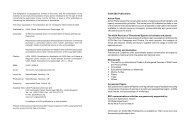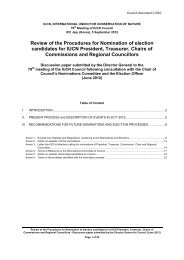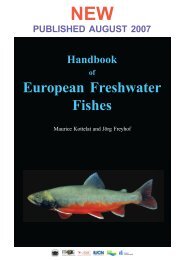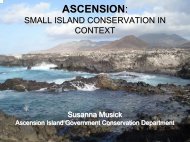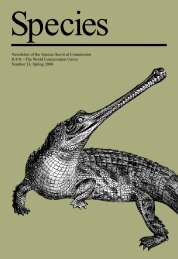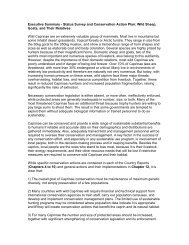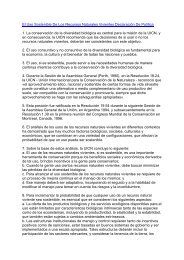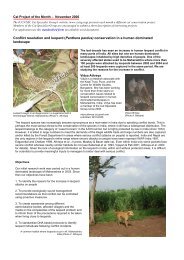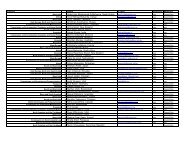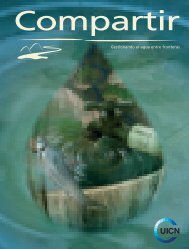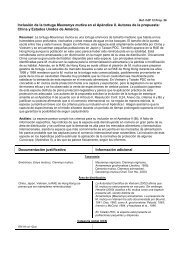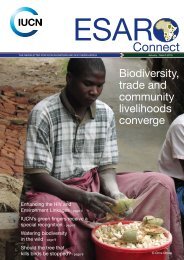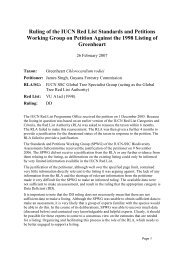Planning education to care for the earth - IUCN Knowledge Network
Planning education to care for the earth - IUCN Knowledge Network
Planning education to care for the earth - IUCN Knowledge Network
Create successful ePaper yourself
Turn your PDF publications into a flip-book with our unique Google optimized e-Paper software.
<strong>Planning</strong> <strong>education</strong> <strong>to</strong> <strong>care</strong> <strong>for</strong> <strong>the</strong> <strong>earth</strong>language <strong>to</strong> <strong>the</strong> rural and functionally illiterate population. Theseper<strong>for</strong>mances trigger discussions, and it has been possible by observationand survey <strong>to</strong> gauge whe<strong>the</strong>r <strong>the</strong>y bring about change. In <strong>the</strong> Sahel, <strong>the</strong><strong>to</strong>pics have included hunting, excessive clearing of lands leading <strong>to</strong> erosion,and damage <strong>to</strong> cultivated land by animals.Organization of <strong>the</strong> <strong>IUCN</strong> programmeThe Ministries of Environment and Education in each country are <strong>the</strong> officialpartners of <strong>IUCN</strong> in its programmes in western Africa. National teamsrecruited by <strong>IUCN</strong> write, publish and distribute <strong>the</strong> magazines <strong>to</strong> <strong>the</strong> schoolchildren. Pupils and teachers convey <strong>the</strong> <strong>education</strong>al message <strong>to</strong> <strong>the</strong>communities. Partnerships between schools, technical departments (health,cattle breeding, agriculture) and <strong>the</strong> population emerge within communities.Village and religious leaders play an important part in raising consciousnessand taking action.At <strong>the</strong> regional level, a <strong>IUCN</strong> adviser is in charge of support, follow-up and<strong>the</strong> organization of training.EvaluationThe <strong>IUCN</strong> programmes have proved <strong>to</strong> be an original way of approachingschool children, making <strong>the</strong>m aware of environmental problems, providing<strong>the</strong>m with <strong>the</strong> technical knowledge <strong>the</strong>y need <strong>for</strong> better management ofnatural resources, and encouraging <strong>the</strong>m <strong>to</strong> take practical action <strong>for</strong> <strong>the</strong>protection of <strong>the</strong>ir environment. The programmes:•serve as demonstrations <strong>for</strong> future action by governments;•support <strong>the</strong> technical government departments which are responsiblein <strong>the</strong> field <strong>for</strong> raising consciousness and <strong>for</strong> teaching adultpopulations in <strong>the</strong> various development sec<strong>to</strong>rs;•serve as a source of experience <strong>for</strong> bilateral and multilateralcooperation partners in developing <strong>education</strong>al programmes;•provide models <strong>for</strong> neighbouring countries facing similarenvironmental problems and willing <strong>to</strong> adopt <strong>the</strong> same type ofprogramme.An assessment of Walia recommended in 1990 <strong>the</strong> extension of <strong>the</strong>programme <strong>to</strong> o<strong>the</strong>r regions where <strong>the</strong> environmental balance is in danger.One conclusion <strong>to</strong> be drawn from <strong>the</strong> Walia approach is that if <strong>the</strong> schoolattendance rate is low, ways have <strong>to</strong> be found <strong>to</strong> reach people outside <strong>the</strong>schools. When programmes are renewed, fresh consciousness-raisingtechniques have <strong>to</strong> be found <strong>to</strong> involve people in environmental conservation.In addition, <strong>the</strong> fact that Walia is extra-curricular leads inevitably <strong>to</strong> a82



